- Online Programs
- MBA Programs
-
-
- Master of Business Administration General Online
- Master of Business Administration in Accounting
- Master of Business Administration in Business Analytics
- Master of Business Administration in Corporate Governance
- Master of Business Administration in Finance
- Master of Business Administration in Healthcare Administration
- Master of Business Administration in Human Resource Management
- Master of Business Administration in Project Management
- Master of Business Administration in Sports Management
- Master of Business Administration in Supply Chain
- View all Online MBA programs
-
-
- Nursing Programs
- MBA Programs
- Getting Started
- Resources
- Apply Now
Know Before You Enroll: RN to BSN Online

In the wake of an increasingly complex and technology-driven healthcare system, a BSN has become the gold standard for nurses. That’s why an RN to BSN program offers that vital first step for diploma and ADN nurses ready to advance their careers. If you are an experienced nurse, the RN to BSN will meet you on your level, expanding and deepening your current knowledge.
With a BSN, you’ll increase your earning potential and become more attractive on the job market. The degree is often required for nurse managers and RNs seeking certification in competitive clinical specialties. For nurses who are just starting out, hospitals favor candidates with a BSN. That’s because multiple research studies correlate bachelor’s-prepared nurses with improved patient outcomes.
Going back to school as a working professional can be challenging, but with an online RN to BSN program, you can log in to class 24/7. It’s a flexible and convenient option for busy nurses. From tuition and financial aid to career outcomes, there’s a lot to consider before getting started. Follow the links below to learn more.
What Is an RN to BSN Degree?

Simply put, an RN to BSN is streamlined to build on your current practice as a working nurse. You won’t have to repeat your clinicals or revisit basic nursing skills. Instead, you’ll round out your education with courses in the humanities and sciences to boost your skills in communication, problem-solving and critical thinking. You’ll advance your knowledge in pathophysiology, evidence-based practice and leadership as well. From physical and psychosocial health assessment to ethics and law in the nursing profession, the RN to BSN degree program is designed to benefit you and your patients.
Bridge programs like the RN to BSN often feature generous credit transfer policies to speed your path to graduation. Some programs, including the online option at the University of South Carolina Aiken, will offer credit to students who have earned an Associate Degree in Nursing (ADN) or diploma in nursing.

As RNs returning for a BSN, our students are already successful nurses. I hope that attaining a BSN will broaden their horizons and opportunities as they move forward in their professional careers.
Why Should I Enroll in an RN to BSN Online Program?
Healthcare employers strongly prefer BSN-prepared nurses. In a 2019 survey, the American Association of Colleges of Nursing (AACN) found that 43% of hospitals and healthcare settings require a BSN for new hires, while 82% strongly favor BSN grads. AACN additionally cites 12 research studies (conducted between 2003 and 2017) linking nurse education with patient outcomes. Among other benefits, BSN-prepared nurses positively impact failure-to-rescue rates, mortality rates, length of stay and readmission rates.
In other words, a BSN is a good bet no matter how you choose to study. The online option, however, works around your busy schedule. Some online programs offer accelerated courses as well, so you can graduate in the shortest time possible. The accelerated online RN to BSN at USC Aiken, for instance, features classes that are only seven weeks in length. You can complete your nursing courses in as few as 12 months.

Earning your BSN is one of the smartest things you can do for your nursing career. Not only are there major salary differences between people with an RN and a BSN, but more importantly, BSN-prepared nurses have been linked to better patient outcomes.
What Will I Learn in an RN to BSN Program?
No matter your career goals and clinical interests, the BSN is a well-rounded degree that prepares you for success in a variety of healthcare settings. As an RN to BSN student, you’ll cover your bases in math, science and the humanities to develop your skills in communication, problem-solving and critical thinking. From there, your major will address evidence-based research, health assessment, community health nursing and pathophysiology. Some programs also include courses in the rapidly expanding field of gerontology.
RN to BSN students at USC Aiken explore nursing care for patients with complex health needs in addition to gerontology. When combined with courses in research, leadership and ethics, your studies provide the tools you need to boost your career and establish a lifelong learning practice.
Are Online Degrees Accredited?
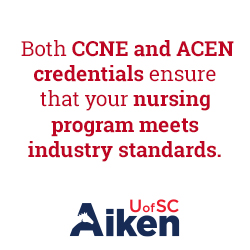
Many of them are, and you definitely don’t want to attend an unaccredited program. That’s especially true when it comes to nursing. If your program isn’t accredited by the Commission on Collegiate Nursing Education (CCNE) or the Accreditation Commission for Education in Nursing (ACEN), healthcare employers aren’t likely to hire you or recognize your degree. Both CCNE and ACEN credentials ensure that your nursing program meets industry standards, while institutional accreditation ensures that your university maintains ethical operations. Without institutional accreditation, you won’t be eligible for federal financial aid or military education benefits.
USC Aiken is institutionally accredited by the Southern Association of Colleges and Schools Commission on Colleges (SACSCOC). Its online RN to BSN is CCNE-accredited. Be sure to confirm institutional accreditations via the U.S. Department of Education, then confirm nursing program accreditation with the CCNE or ACEN.
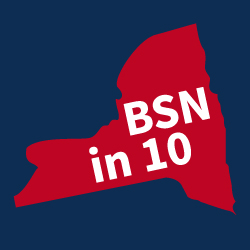
You may already be familiar with the Institute of Medicine (IOM), which published its landmark report on The Future of Nursing in 2010. In it, the IOM (now known as the National Academy of Medicine) announced the goal of an 80% BSN-prepared nursing workforce by 2020. This announcement was based on several factors, including the expanding role of RNs in healthcare, an increasingly complex healthcare system, and research connecting educational attainment to positive patient outcomes.
The IOM goal has shaped hospital policies and healthcare hiring ever since. In some cases, a BSN is required by law. Nurses in the state of New York, for instance, must earn a bachelor’s degree within 10 years of initial licensure. Similar legislation is under consideration in multiple states. As Inside Higher Ed reports, it’s no wonder that the number of registered nurses with a BSN grew by 170% between 2010 and 2017. In fact, AACN notes that after the IOM report was released, enrollment in RN to BSN programs increased by 76%. This progress is remarkable, but still fell short of the IOM’s deadline. Instead, HealthLeaders notes that the BSN workforce will likely reach 80% by 2029. While the date has certainly shifted, the goal remains the same.
What’s the Career Outlook for BSN Nurses?

The career outlook for registered nurses is much brighter than the national average. According to the U.S. Bureau of Labor Statistics (BLS), RNs can expect a 12% rate of job growth from 2018 to 2028 (the average is 5%). The BLS additionally notes that registered nurses with a BSN typically enjoy better job prospects than diploma and ADN RNs. Nurses with experience in gerontology may find their prospects improved as well.
Given the growing nursing shortage, healthcare employers rely on BSN nurses to apply advanced critical thinking skills across the spectrum of care. The National Center for Health Workforce Analysis found that South Carolina, Texas, California and New Jersey will experience the greatest RN shortfalls by 2030. While BSN nurses will continue to see excellent job opportunities throughout the country, these four states offer the best prospects.
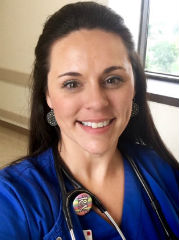
When I accepted my position at the hospital, it was almost a requirement for us to get a four-year degree. I appreciated the push to go ahead and complete that goal. It was part of the bigger picture.
What Is the Average BSN Salary?
Job data compiled by ZipRecruiter reveals that the average salary for RNs is $69,265 per year. For BSN RNs, the average is $79,738. These numbers fluctuate widely based on location. That’s because local factors such as labor supply and demand, funding resources and cost of living impact salaries.
The chart below shows several states where BSN nurses make more than their diploma and ADN peers:
| State | Average RN Salary | Average BSN RN Salary |
|---|---|---|
| Florida | $58,371 | $67,196 |
| Mississippi | $59,489 | $68,483 |
| Georgia | $61,991 | $71,364 |
| Louisiana | $64,294 | $74,015 |
| South Carolina | $65,413 | $75,304 |
Source: ZipRecruiter (October 2019)

USC Aiken has a really good reputation with the CSRA [Central Savannah River Area] hospitals in our area. I wanted to be a part of that.
Which Clinical Specialties Favor BSN Nurses?
Healthcare employers prefer BSN-prepared nurses across the board, but for some clinical specialties, a bachelor’s degree is all but required. Some employers may even hire you based on the condition that you complete the BSN within a set time frame. Given these factors, the following clinical specialties reflect the higher salaries enjoyed by bachelor’s-prepared nurses:
| Specialization | Average Salary in South Carolina | Average Salary in Florida | Average Salary in Georgia | Average Salary in Kentucky |
|---|---|---|---|---|
| Oncology | $85,227 | $76,661 | $81,416 | $84,828 |
| Emergency | $85,911 | $76,921 | $81,350 | $84,500 |
| Perioperative | $87,287 | $77,889 | $82,720 | $85,854 |
| Acute/Critical Care | $88,204 | $78,708 | $83,590 | $86,756 |
| Gerontology | $92,733 | $82,749 | $87,882 | $91,211 |
Source: ZipRecruiter (October 2019)
– Jennifer Farrer 2017 USC Aiken online RN to BSN graduate
How Much Do BSN Nurse Managers Make?
For nurses interested in a management role, a BSN is more important than ever. The Department of Veterans Affairs, which also happens to be the largest U.S. employer of RNs, requires a BSN for all nursing roles outside of entry-level positions. Magnet hospitals are another sizeable employer to heavily favor a BSN-prepared workforce. All nurse leaders and managers in Magnet hospitals must hold a bachelor’s degree, and 80% of staff nurses are required to hold a BSN as well.
Luckily, pay rates for jobs in nurse management reflect the education and experience required to step into a leadership role:
| Job Title | Average Salary |
|---|---|
| Occupational Health Manager | $81,466 |
| Infection Control Manager | $84,735 |
| Medical Practice Administrator | $84,945 |
| Clinical Operations Manager | $91,785 |
| Assistant Nurse Manager | $97,500 |
| Nurse Director | $100,357 |
| Operating Room Nurse Manager | $120,819 |
Source: ZipRecruiter (October 2019)
“I’m 35, so the real reward is just getting that BSN, getting to be a part of the whole USC Aiken experience and the interaction I’ve had with the teachers. They have freely offered up professional advice that has not only helped me with my schoolwork, but also influenced my delivery of care at the hospital.” – Jennifer Farrer, USC Aiken online RN to BSN graduate and assistant nurse manager at University Hospital in Augusta, Georgia
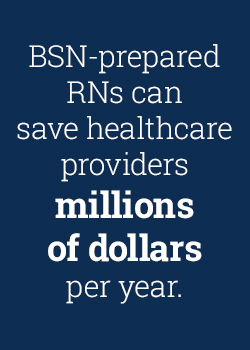
As AACN revealed in a 2019 survey, 43% of hospitals and healthcare settings require a BSN for new hires, while 82% strongly favor BSN grads. Much of this preference traces back to the established link between bachelor’s-prepared nurses and improved patient outcomes. Yet, patients aren’t the only ones to benefit. Improved standards of care also affect the bottom line. Medicare, for instance, won’t reimburse hospitals when too many patients are readmitted within 30 days of discharge. Healthcare employers also lose out on Medicare funds related to care for pressure ulcers, falls and hospital-acquired infections.
These are the very events that bachelor’s-prepared nurses have been proven to reduce. As HealthLeaders reports, patients who receive 80% or more of their care from BSN RNs were 18.7% less likely to return for readmission. This outcome led to annual provider savings of $5.6 million. When researchers accounted for the higher salaries commanded by BSN nurses, the savings came to $3.8 million. Healthcare employers and patients benefit from a majority BSN staff, and nurses benefit too. Eighty percent of nursing staff at Magnet hospitals hold a BSN, and these hospitals enjoy lower nurse-to-patient ratios, lower turnover and burnout rates, and higher rates of job satisfaction.
Is Tuition for an Online RN to BSN Program Expensive?
Tuition for online RN to BSN programs can vary by thousands of dollars, and it can be difficult to determine your out-of-pocket expenses. Start by multiplying the cost per credit hour (sometimes called semester hour) by the number of hours required for your nursing major. Then ask your prospective program about any additional fees. Clemson University, for instance, charges an extra $46 per credit hour with combined fees for information technology, library use, matriculation and software licensing. With 32 credit hours of nursing major, this amounts to an additional expense of $1,472. Check out the chart below for a brief overview of online RN to BSN tuition rates in South Carolina:
| Institution | Credit Per Credit Hour | Nursing Credits | Fees Included |
|---|---|---|---|
| Medical University of South Carolina | $548 | 30 | No |
| Clemson University | $550 | 32 | No |
| USC Upstate/Palmetto College | $467 | 32 | No |
| Anderson University | $430 | 31 | No |
| University of South Carolina | $410 | 31 | No |
| USC Aiken | $306 | 31 | No |
*Cost figures taken from university websites, October 2019
Do Online RN to BSN Programs Charge More for Out-of-State Tuition?

Some do, but many don’t. If a prospective program charges the same tuition regardless of location, be sure to confirm interstate enrollment through the National Council for State Authorization Reciprocity Agreements (NC-SARA).
South Carolina is an NC-SARA member, and USC Aiken’s online RN to BSN tuition applies to both in-state and out-of-state students. If you live in an NC-SARA state, you’re eligible to apply.
Are Online Students Eligible for Financial Aid?
If your institution is accredited, you can successfully apply for federal financial aid. Simply fill out the Free Application for Federal Student Aid (FAFSA) on the Federal Student Aid website. If you have existing federal loans from prior studies, you’re probably still eligible for additional funding. First, check to make sure that your student loan debt is under the limit. Then make sure you’re not in default. Once that’s taken care of and you’ve received your new loans, you can apply for loan deferment, which allows you to suspend loan payments while you’re enrolled for your RN to BSN.
Grants and scholarships are another great option, especially since you won’t have to pay them back. U.S. News & World Report offers a handy guide to college scholarships, but you can narrow your search by focusing on funding for nurses. Both Nurse.org and AACN offer a targeted list of options.
What About Loan Forgiveness and Tuition Reimbursement?

Both tuition reimbursement and loan forgiveness are available to online RN to BSN students, but only if you attend an accredited program. Assuming you’re set on that point, you’ll want to research your options. Healthcare employers who offer tuition reimbursement, for instance, may require you to remain with the company for a set period of time, or you may not be eligible if you’ve just started working there. Simply confirm policies with your HR representative, or search online for South Carolina hospitals with tuition reimbursement benefits. For instance, Prisma Health offers education benefits to its employees.
Loan forgiveness, like tuition reimbursement, also comes with unique guidelines for eligibility. Many options require a service commitment, providing funding in exchange for clinical work in a high-need role or underserved community. U.S. News & World Report offers a helpful overview, or you can explore individual programs through the U.S. Department of Education, Indian Health Service, and National Health Service Corps.
Can I Apply My Military Education Benefits to an Online Degree?
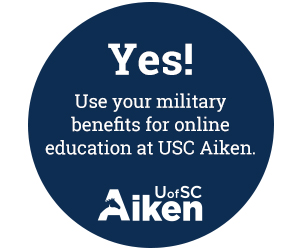
Yes! Like federal financial aid or loan forgiveness, military education benefits are available to online students. As long as your institution is accredited, servicemembers, veterans, spouses and dependents are eligible. You can confirm your university’s benefit and estimate potential payouts with the GI Bill Comparison Tool.
USC Aiken is a designated Military Friendly school. The university’s dedicated Veteran and Military Student Success Center (VMSSC) offers guidance for VA benefits, DoD Tuition Assistance, financial aid and scholarship opportunities, paperwork requirements and transfer credits. VMSSC also offers information on additional services for military veterans, active or reserve service members and their families.
Which Courses Will I Complete in an RN to BSN Program?
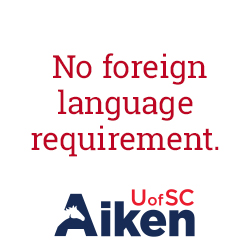
All bachelor’s degrees include courses in the humanities, math and science. Coursework across these subjects will develop your communication skills and analytical skills, and the nursing major builds on this foundation to advance your practice. If you have any prior college-level coursework, you’re probably eligible to transfer credits for general courses.
Online RN to BSN students at USC Aiken complete 31 credit hours of nursing major courses, and ADN nurses are awarded an additional 34 credit hours toward their degree. The curriculum also includes a combined 55 credit hours in general education, core subjects and humanities. Unlike many colleges in South Carolina, USC Aiken has no foreign language requirement.
Remember, you’re still earning a bachelor’s degree, and the federally mandated requirement for any bachelor’s degree is a minimum of 120 credit hours.
What Will I Study in My Nursing Major Courses?
Nursing major courses are designed to deepen and expand upon your current expertise. If your program is accredited, coursework is additionally vetted to meet industry standards. That’s why you’ll probably study evidence-based research, nursing theory and health assessment. Aside from that, your program may feature courses in community nursing or gerontology. While the exact curriculum can vary, RN to BSN programs provide the tools you need to become a lifelong learner and stronger patient advocate.

Students enrolled in USC Aiken’s online RN to BSN complete nine nursing major courses for a total of 31 credit hours:
- Professional Nursing
- Health Assessment
- Pathophysiology
- Ethical-Legal Issues in Nursing
- Nursing Care of the Client with Complex Health Needs
- Nursing Research
- Gerontological Nursing
- Community Health Nursing
- Leadership & Management

In the research class I took, I always tried to base my subject matter on something I was doing at work. I was able to change one of the policies we were using at work with our radiation patients to help them. That was extremely gratifying.
– Tonya Rogers, USC Aiken online RN to BSN graduate and radiation oncology nurse at Lexington Medical Center in West Columbia, South Carolina
The [Nursing Care of the Client with Complex Health Needs] course was a nice review to help me with my current job. I am not a bedside nurse. I do diabetes education, and I see patients and provide them with self-management skills, but we do in-patient education, too. It helps me evaluate patients in the critical care setting and when they’re in the acute crisis in their diabetes.
– Cathy Reinhart, USC Aiken online RN to BSN student in Charleston, South Carolina

Do I Have to Finish General Education Courses Before Starting My Nursing Major?
Policies change from program to program. While some universities require you to complete your general education coursework before starting your nursing major, some allow you to complete courses concurrently. Other programs fall somewhere in the middle. That means a handful of courses are required beforehand, but the rest are not. Either way, a program advisor will help you create a degree plan based on your schedule and transfer credits.

Online RN to BSN courses at USC Aiken fall into one of four categories: General Education, Humanities, Core and Nursing Major. You can enroll for general education and humanities credits whenever it’s convenient for you. There are seven core courses, however, that must be completed before enrolling in the nursing major courses. An additional two core classes, Statistics and Intro to Chemistry, are more flexible, but you’ll need them to enroll in Nursing Research and Pathophysiology, respectively.
How Are Transfer Credits Determined?
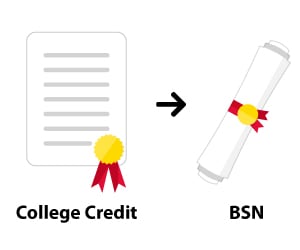
If you’ve successfully completed accredited college-level coursework, you can probably assign those credits toward your bachelor’s degree. Submitting prior transcripts is typically part of the application process. After you apply, an academic advisor will review your transcripts for transfer equivalent courses and determine your degree plan.
In addition to general education courses, USC Aiken also accepts transfer credits for nursing major courses and upper-level BSN courses that are less than five years old. The university will provide a personalized Transfer Credit Summary after reviewing the transcripts provided in your application.
Will I Repeat Clinicals for My RN to BSN?

You’ve already mastered the basics of patient care, so there’s no need to repeat your clinicals. Instead, you’ll engage in practice experiences designed to advance your skill set. You may oversee a change project, conduct a root cause analysis or participate in simulated clinical scenarios. The specifics will vary depending on your school, but practice experiences are an accreditation standard for nursing programs.
Students enrolled in USC Aiken’s online RN to BSN will practice health assessment and screening procedures in a client-simulated lab, select a topic for research, and engage in a precepted senior project.
How Does the Practice Experience Work in an Online RN to BSN Program?
Every school sets its own policies. You might conduct your practice experience as a project or simulation, or you may select a preceptor and a clinical site convenient to your location. You’ll probably encounter a combination of these options.
For practice experiences at clinical sites, many universities allow online RN to BSN students to choose their place of work. That said, the practice experience must take place off the clock. It’s also common to complete practice hours outside of your day-to-day duties, in a different department and with a preceptor who isn’t your supervisor. No matter the details, your instructors and academic advisors will work with you to keep you on track for success.

You won’t find a better program than USC Aiken. The faculty here are involved and caring and really go out of their way to make your experience pleasant and productive.
The USC Aiken staff has been really helpful and accommodating. You’ve just got to put in the work and reap the benefits.
– Cathy Reinhart, USC Aiken online RN to BSN student in Charleston, South Carolina

Can I Graduate From an RN to BSN Program in Less Than Two Years?
Your path to graduation depends on your transfer credits and the number of classes you complete per semester. Choosing an online program, however, can significantly speed up the timeline. That’s because traditional on-campus courses generally run for 15 weeks. Online accelerated courses, on the other hand, are around seven weeks long. Where a traditional program will take at least two years, an accelerated program can be completed in half the time.
At USC Aiken, courses in the online RN to BSN are seven weeks in length. You can work through your nursing major in as few as 12 months by taking two courses per term. For students who prefer a lighter pace, the timeline extends to 18 months.
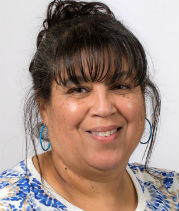
I am a first-generation college student. My motto is that challenges may be stumbling blocks — step over them and keep going. Challenges may seem to be mountains — just go around them, and keep going.
– Dr. Joyce Pompey Associate Professor at USC Aiken
How Much Time Will I Need to Study?

Because accelerated courses cover the same material in half the time of traditional courses, you’ll want to set aside nine to 12 hours per week for every course you take. You’ll spend roughly three hours per week on your “in class” participation, including time spent on class discussion forums, completing course modules or viewing video lectures. The remaining six to nine hours will be dedicated to reading, studying and working on assignments.
Begin and complete your assignments early to avoid feeling overwhelmed and stressed.
– Carolyn Sue-Ling, Instructor at USC Aiken

How Do Online Classes Work?

Online courses are administered through a Learning Management System (LMS), such as Blackboard or Canvas. You simply enter your username and password and log in to your personalized account. After that, you’ll find links to your active courses. Select a course to enter your virtual classroom. There, you’ll find links to upload assignments, download readings and course materials, view video lectures, and comment in class discussions. Like any other website, it takes a few minutes to get used to the layout, but after that, you’re good to go.
Online RN to BSN students at USC Aiken access courses via Blackboard. Should you run into any technical issues, there’s a dedicated Help Desk available Monday through Friday from 8:00 am to 5:00 pm.

It’s been extremely manageable. The schedule has been wonderful. There hasn’t been a time when I wasn’t able to get my work done — at least none that wasn’t my own fault.
– Tonya Rogers, USC Aiken online RN to BSN graduate and radiation oncology nurse at Lexington Medical Center in West Columbia, South Carolina
Can I Log In to Class From My Mobile Device?
If you’re in the middle of a hectic shift or you only have time to log in on your lunch break, you can access the LMS from your phone or tablet. Both Blackboard and Canvas offer mobile apps for download, or you can use your browser to log in. While you’ll probably want a computer or laptop for assignments that require word processing, spreadsheets and presentations, you can definitely download readings, comment in class forums, or view video lectures with your phone or tablet. No matter your preferred device, be sure to log in to courses every day. That way, you can keep up with class conversations and course announcements.

Keep the lines of communication open and ask your professors for help when you have questions.
Are Online Professors As Qualified As On-Campus Professors?
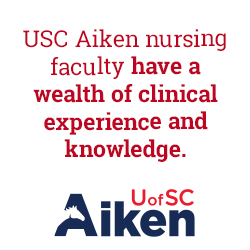
If your program is properly accredited, RN to BSN online faculty will be just as qualified as on-campus faculty. In many cases, they’re one and the same. Whether your professors teach online, on campus or in both formats, they will hold an MSN at a minimum, and all of them will have clinical experience.
Most professors at USC Aiken hold a doctorate, and the remainder are MSN-prepared. Taken together, the online RN to BSN faculty hold clinical experience in women’s health, endoscopy, community health, pediatric critical care, acute behavioral health, nurse management, hospice, neonatal intensive care, home health, cardiovascular nursing and case management.

A lot of my colleagues are doing online nursing programs. I felt like USC Aiken was more credible.
How Do I Communicate With My Instructors?
Professors who teach online can be reached through phone, email and LMS. Some faculty will maintain virtual office hours for video chat appointments, and some are available via text. You’ll generally find communication policies in your course syllabus.
Regardless of the method that works best for you and your instructor, faculty will respond within 24 or 48 hours. That’s especially true in an online RN to BSN program. Professors have already walked a mile in your shoes, balancing their clinical work with a college education.
Nursing faculty are always available to assist students when needed.
– Dr. Katie A. Chargualaf Assistant Professor at USC Aiken
Which Student Services Are Available to Online Students?

Accredited programs are dedicated to student success, which is why digital library access, research assistance and tech support are available to online students. At USC Aiken, the Ask a Librarian chat service is available 24 hours a day, Monday through Friday, and on weekends from 8:00 am to midnight. Librarians are also available for phone appointments. You can email or fill out a web form request as well.
Will I Meet the Admission Requirements for RN to BSN Programs?

Like curriculum details and transfer credit policies, admissions requirements will change from university to university. They’ll also share several common elements. Most RN to BSN programs, for instance, require a valid RN license and a minimum GPA from your prior coursework. Some programs will additionally ask for recommendation letters or personal statements.
If you’re applying to USC Aiken for the online RN to BSN, you won’t need recommendation letters or personal statements. You will need a minimum cumulative 2.5 GPA, and a valid RN license in the state where you’ll be completing your precepted hours. Because South Carolina is an NC-SARA member, students who live and work in an NC-SARA state are welcome to apply. You can confirm eligibility for out-of-state attendance with an enrollment specialist at 844-878-3634.
When Can I Apply and Enroll?
If your RN to BSN program runs on a traditional semester schedule, you’ll have one to three opportunities for application and enrollment per year. Accelerated online calendars are far more flexible. They offer three to six starts, and many accept applications year round.
USC Aiken lands on the higher end of the spectrum with six enrollment opportunities per year. The course and enrollment calendar is available online. Apply anytime.
Sources
Blaine County School District
Welcome to BCSD2019-2020 Certified Salary Schedule
CHEA: Regional Accrediting Organizations-Northwest
College Board: 2019-2020 Published In-state Tuition and Fees at Public Four-year Institutions by State
Elk Grove Unified School District
HomeCertified District Salary Schedule #10
Forbes: For-Profit Colleges’ Teachable Moment: ‘Terrible Outcomes Are Very Profitable’
Independent School District of Boise City: Teacher-Counselor-Nurse Certified Salary Schedule
National Association for the Education of Young Children (NAEYC)
Summary of the NAYEC Professional Preparation StandardsAccreditation
Overview: Power to the Profession
National Center on Early Childhood Quality Assurance: QRIS Resource Guide
Northwest Commission on Colleges and Universities (NWCCU)
Payscale
Master of Education (M.Ed.), Early Childhood Education DegreeBachelor of Education, Early Childhood Education Degree
Portland Public Schools: 192 Day Salary Schedule
Sacramento City Unified School District: K-12 and Preschool Teachers' Salary Schedule
Seattle Public Schools: 2019-2020 Certified Instructional Staff Salary Schedule
State of Washington
Professional Educator Standards Board (PESB)PESB Agency Overview: Who We Are
U.S. Bureau of Labor Statistics
Occupational Outlook Handbook: Preschool TeachersOccupational Outlook Handbook: Kindergarten and Elementary School Teachers
U.S. Department of Education
Overview of Accreditation in the United StatesAm I Eligible to Receive Financial Aid?
FAFSA: Apply for Aid
Wondering Whether You Can Get Your Federal Student Loans Forgiven for Your Service as a Teacher?
U.S. Department of Health and Human Services, Administration for Children and Families: Head Start Programs
U.S. Department of Veterans Affairs
Education and TrainingYellow Ribbon Program

